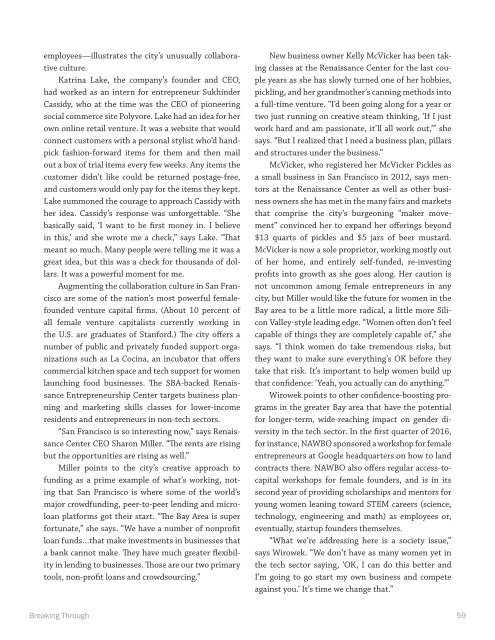BREAKING THROUGH
YWkgl
YWkgl
Create successful ePaper yourself
Turn your PDF publications into a flip-book with our unique Google optimized e-Paper software.
employees—illustrates the city’s unusually collaborative<br />
culture.<br />
Katrina Lake, the company’s founder and CEO,<br />
had worked as an intern for entrepreneur Sukhinder<br />
Cassidy, who at the time was the CEO of pioneering<br />
social commerce site Polyvore. Lake had an idea for her<br />
own online retail venture. It was a website that would<br />
connect customers with a personal stylist who’d handpick<br />
fashion-forward items for them and then mail<br />
out a box of trial items every few weeks. Any items the<br />
customer didn’t like could be returned postage-free,<br />
and customers would only pay for the items they kept.<br />
Lake summoned the courage to approach Cassidy with<br />
her idea. Cassidy’s response was unforgettable. “She<br />
basically said, ‘I want to be first money in. I believe<br />
in this,’ and she wrote me a check,” says Lake. “That<br />
meant so much. Many people were telling me it was a<br />
great idea, but this was a check for thousands of dollars.<br />
It was a powerful moment for me.<br />
Augmenting the collaboration culture in San Francisco<br />
are some of the nation’s most powerful femalefounded<br />
venture capital firms. (About 10 percent of<br />
all female venture capitalists currently working in<br />
the U.S. are graduates of Stanford.) The city offers a<br />
number of public and privately funded support organizations<br />
such as La Cocina, an incubator that offers<br />
commercial kitchen space and tech support for women<br />
launching food businesses. The SBA-backed Renaissance<br />
Entrepreneurship Center targets business planning<br />
and marketing skills classes for lower-income<br />
residents and entrepreneurs in non-tech sectors.<br />
“San Francisco is so interesting now,” says Renaissance<br />
Center CEO Sharon Miller. “The rents are rising<br />
but the opportunities are rising as well.”<br />
Miller points to the city’s creative approach to<br />
funding as a prime example of what’s working, noting<br />
that San Francisco is where some of the world’s<br />
major crowdfunding, peer-to-peer lending and microloan<br />
platforms got their start. “The Bay Area is super<br />
fortunate,” she says. “We have a number of nonprofit<br />
loan funds…that make investments in businesses that<br />
a bank cannot make. They have much greater flexibility<br />
in lending to businesses. Those are our two primary<br />
tools, non-profit loans and crowdsourcing.”<br />
New business owner Kelly McVicker has been taking<br />
classes at the Renaissance Center for the last couple<br />
years as she has slowly turned one of her hobbies,<br />
pickling, and her grandmother’s canning methods into<br />
a full-time venture. “I’d been going along for a year or<br />
two just running on creative steam thinking, ‘If I just<br />
work hard and am passionate, it’ll all work out,’” she<br />
says. “But I realized that I need a business plan, pillars<br />
and structures under the business.”<br />
McVicker, who registered her McVicker Pickles as<br />
a small business in San Francisco in 2012, says mentors<br />
at the Renaissance Center as well as other business<br />
owners she has met in the many fairs and markets<br />
that comprise the city’s burgeoning “maker movement”<br />
convinced her to expand her offerings beyond<br />
$13 quarts of pickles and $5 jars of beer mustard.<br />
McVicker is now a sole proprietor, working mostly out<br />
of her home, and entirely self-funded, re-investing<br />
profits into growth as she goes along. Her caution is<br />
not uncommon among female entrepreneurs in any<br />
city, but Miller would like the future for women in the<br />
Bay area to be a little more radical, a little more Silicon<br />
Valley-style leading edge. “Women often don’t feel<br />
capable of things they are completely capable of,” she<br />
says. “I think women do take tremendous risks, but<br />
they want to make sure everything’s OK before they<br />
take that risk. It’s important to help women build up<br />
that confidence: ‘Yeah, you actually can do anything.’”<br />
Wirowek points to other confidence-boosting programs<br />
in the greater Bay area that have the potential<br />
for longer-term, wide-reaching impact on gender diversity<br />
in the tech sector. In the first quarter of 2016,<br />
for instance, NAWBO sponsored a workshop for female<br />
entrepreneurs at Google headquarters on how to land<br />
contracts there. NAWBO also offers regular access-tocapital<br />
workshops for female founders, and is in its<br />
second year of providing scholarships and mentors for<br />
young women leaning toward STEM careers (science,<br />
technology, engineering and math) as employees or,<br />
eventually, startup founders themselves.<br />
“What we’re addressing here is a society issue,”<br />
says Wirowek. “We don’t have as many women yet in<br />
the tech sector saying, ‘OK, I can do this better and<br />
I’m going to go start my own business and compete<br />
against you.’ It’s time we change that.”<br />
Breaking Through 59


